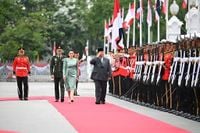Thailand’s political landscape was thrown into fresh turmoil on August 29, 2025, as the country’s Constitutional Court delivered a landmark ruling that ousted Prime Minister Paetongtarn Shinawatra from office. After just a year in the position, Paetongtarn—Thailand’s youngest-ever prime minister and a scion of the nation’s most prominent political dynasty—was found to have violated constitutional ethics in a phone conversation with Cambodia’s former leader Hun Sen. The decision, reached by a 6-3 margin, has not only shaken the government but also reignited debate over the role of the judiciary in Thai politics.
According to reporting from UPI, the court’s ruling declared that Paetongtarn "lacks the qualifications and possesses prohibited characteristics" under the Thai constitution. The judgment, which cannot be appealed under Thai law, meant her immediate removal from office and the dissolution of her cabinet. Deputy Prime Minister Phumtham Wechayachai has stepped in as interim leader until parliament selects a new head of government.
The controversy centers on a leaked phone call that took place in June 2025, at a particularly sensitive moment. Just a month earlier, Thailand and Cambodia had clashed violently along their shared border, stoking nationalist sentiment and raising the stakes for any diplomatic engagement. In the call, Paetongtarn reportedly referred to Hun Sen as “uncle,” adopted a deferential tone, and openly criticized her own military’s actions at the border. Most notably, she was overheard telling Hun Sen, “if he wants anything, just tell me, and I will take care of it.”
This exchange, coming so soon after armed conflict, touched a nerve in Thailand. As BBC and other outlets reported, the conversation was seen by many as prioritizing personal political interests and foreign relationships over national security. The court’s majority opinion echoed this view, stating that Paetongtarn’s behavior “demonstrated the weakness of domestic [Thai] politics” and constituted a serious breach of ethical standards expected of the country’s leaders.
In July, the fallout from the call intensified when 36 senators filed a petition with the Constitutional Court, alleging that Paetongtarn had failed to fulfill her constitutional duties. The petition cited sections 160(4) and 160(5) of the constitution, which require ministers to be “of evident integrity” and prohibit “behavior which is a serious violation of […] ethical standards.” The court responded by suspending Paetongtarn pending investigation, a move that set the stage for Friday’s decisive verdict.
Friday’s ruling, as explained by The Bangkok Post, is the fifth time since 2008 that Thailand’s highest court has removed a sitting prime minister. The most recent prior case was the ouster of Srettha Thavisin, following controversy over his appointment of an official with a criminal record. The pattern of judicial intervention has fueled ongoing debate about the balance of power in Thailand’s constitutional system and the scope of the court’s authority to interpret ethical standards for political officials.
Paetongtarn’s removal is particularly striking given her background. She is the daughter of former Prime Minister Thaksin Shinawatra and the niece of former Prime Minister Yingluck Shinawatra, both of whom were themselves removed from power under controversial circumstances. Her rapid rise to the premiership—serving only a year before her dismissal—had been seen by supporters as a sign of the Shinawatra family’s enduring influence in Thai politics. Critics, however, have long argued that the family’s dominance has contributed to chronic instability and power struggles between elected governments and unelected institutions.
For many Thais, the phone call that triggered Paetongtarn’s downfall was more than a simple diplomatic misstep. The fact that she used a deferential tone and criticized her own military, especially during a period of heightened nationalist fervor, was viewed as undermining the country’s security and dignity. The court’s ruling stated that her actions “prioritized personal political interests over national security considerations,” a line that resonated with those who saw her conduct as disloyal or out of touch with public sentiment.
Yet, the decision has not gone without criticism. Some legal scholars and political observers, as noted by Reuters, argue that the court’s broad authority to adjudicate “ethical violations” is problematic, lacking clear boundaries and leaving room for subjective judgments. They point out that the constitution’s requirements for ministers to be of “evident integrity” are open to interpretation and have been invoked in ways that some see as politically motivated. This, they say, threatens to undermine the rule of law and perpetuate cycles of instability in Thai governance.
The immediate impact of Paetongtarn’s removal has been a scramble for leadership within the government. With her cabinet dissolved, Deputy Prime Minister Phumtham Wechayachai is serving as the caretaker leader. The process for selecting a new prime minister is now underway, with parliament expected to convene in the coming weeks. The outcome of this process could shape the direction of Thai politics for years to come, as parties and factions jockey for influence in the wake of another high-profile judicial intervention.
Meanwhile, the Shinawatra family’s future in politics remains uncertain. Despite repeated setbacks at the hands of the judiciary, their political network retains significant support, especially in rural areas and among working-class voters. Whether Paetongtarn or another family member will seek a return to power is an open question, but few expect the dynasty to fade quietly from the scene.
As the dust settles, many in Thailand are left reflecting on the broader implications of the court’s decision. Was the ruling a necessary defense of constitutional ethics and national security, or another example of the judiciary overstepping its bounds? The answer may depend on one’s perspective, but what’s clear is that the debate over the proper limits of judicial power—and the role of the Shinawatra family in Thai politics—is far from over.
With the country once again navigating a period of uncertainty, all eyes are now on parliament and the next chapter in Thailand’s turbulent political story.

